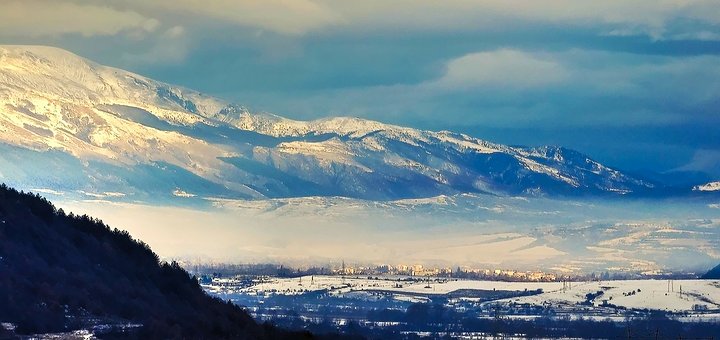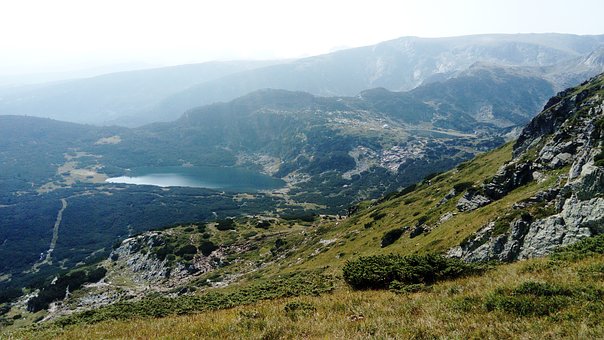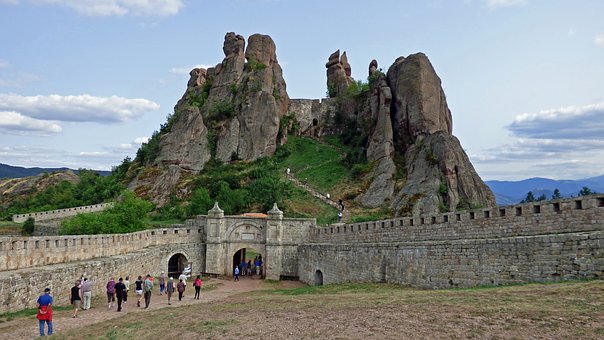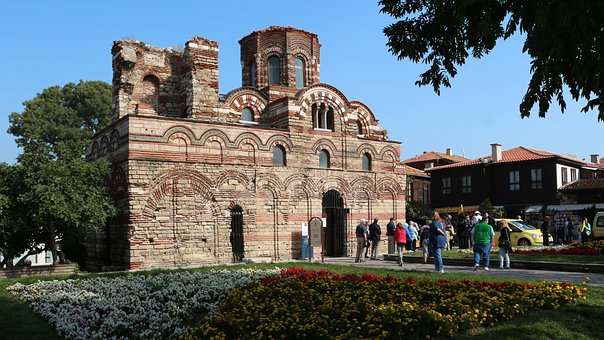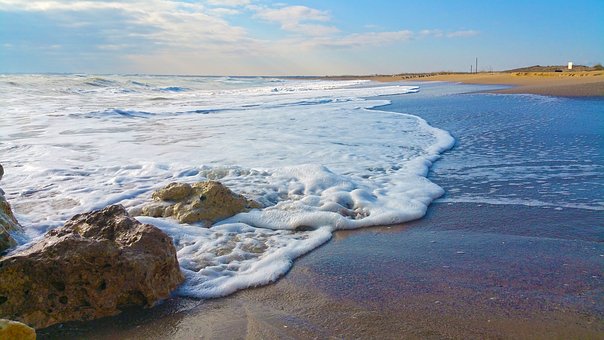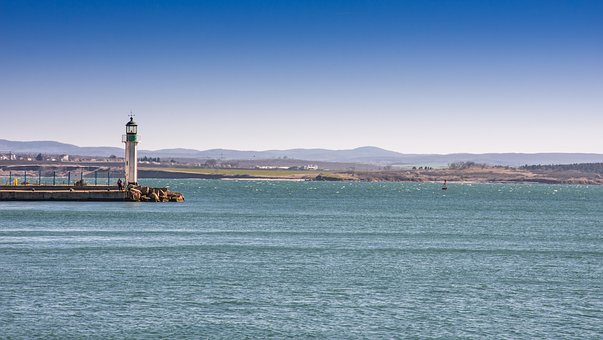Backpacking in Bulgaria
If you think of the Eastern European country Bulgaria, the golden beach and the sunny beach come to mind. But away from the tourist centres on the Black Sea coast, the country has much more to offer on a backpacker trip. So you will find original landscapes, unique cultural treasures and a special way of life. In the south and west of the country there are high mountains, which invite you to hiking and trekking. In the winter months the mountains become a wonderful ski area with great conditions for winter sports.
In the Rila Mountains and the Rhodopes you can find places like Bansko, Borovets and Pamprovo. They are all located at the same latitude as Rome and at altitudes up to 2900 metres above sea level. The capital of Bulgaria is Sofia with about 1.2 million inhabitants. The country covers an area of 110,994 km², where a total of 7.1 million people live. Since the political change in the 1990s, the country has become somewhat quieter.
As Bulgaria is a transit country between the Middle East and Central Europe, there is a reasonably well developed road network on which you can easily travel from A to B. Away from the main roads, you will still find desolate routes. There are also several airports, including Sofia and Burga, 2 large deep sea ports and several smaller seaports. You can also travel by rail, as all big cities in Bulgaria are connected to it.
In addition to the beautiful Black Sea coast and wonderful mountain landscapes, you will find the crafts, art and architecture of the former cultural peoples who ruled the country. Among them are 7 sites, like the church of Bojana (Bojanska Cerka in Sofia, the monastery Rila and the Theakergrab of Sweschtari and two nature reserves, which belong to the UNESCO world heritage. Backpacking through Bulgaria you will experience a predominantly continental climate. In the west the summer is short and warm and the winter long and cold.
The official language is Bulgarian. Turkish, Armenian and Romani are also spoken. You will often find signs and newspapers in Cyrillic script. In the tourist areas German, Russian and English are spoken. Away from these areas, you as backpackers will sometimes encounter difficulties in communication. Then only hands and feet will help you to communicate.
You can get cash at the various cash machines. The machines will give you the Bulgarian currency Leva. For cash withdrawals you should use a credit card, where there are no additional costs for withdrawals abroad. In large cities and tourist areas, you can also withdraw money with your EC card if the ATM is marked with the Mastero symbol.
If you want to exchange euros you have brought with you to Leva, you should avoid the many exchange offices if possible, even if “Change” in large letters promise a decent exchange rate. You’d better go to the nearest bank to change money or withdraw money.
Bulgarian cuisine offers a variety of delicacies that you shouldn’t miss. For your meals there is a small restaurant or street stalls and snack stalls, which take care of your physical well-being.
Culture in Bulgaria
For a long time, the basic principles of culture in Bulgaria were characterized by collectivism. This is based on the country’s communist roots. Family and family life as well as education were aimed at the well-being of the group, so that even today several generations still live under one roof. Children usually stay at home even after they have reached the age of majority and give away their earned money at home.
Younger Bulgarians often feel more independent and a tendency towards individualism. They navel themselves away from the collective and live according to the guidelines of independence, self-confidence and self-confidence. On your backpacker trip through Bulgaria you will find that everything in the country is more unregulated than in Germany.
Bulgarians are also very sparing with courtesy, so you’re guaranteed to be surprised. On the other hand, the locals are very hospitable. What makes travelling in Bulgaria so interesting are the small differences that sometimes lead to communication difficulties.
If you are confused, there will certainly be some gestures. If a Bulgarian shakes his head from right to left, he doesn’t mean “no” but “yes”! Nodding your head means “no”. So exactly the other way around! But you’ll get used to it very quickly.
More Backpacking Information about Bulgaria
Bulgaria is not a cheap travel country, but in comparison to Germany you will soon find out that you get a lot for your money. You should already plan a daily budget of 50 to 80 Euro. With that you can make ends meet and you can also afford the luxury of staying overnight in a chic hotel. There are real bargains in hostels, which you can use for an overnight stay. You can stay there for as little as 7 euros a night. The average price is around 13 Euros.
The country offers you unforeseen experiences, which are not only presented in dreamlike landscapes, but also in wonderful cultural treasures. The influence of the Ottoman Empire often determines architecture and art history. Apart from the Black Sea coast, Bulgaria’s backpacking landscape is characterised by wide plains and numerous idyllic rivers.
The Balkan Mountains offer you unique landscape formations, from steeply sloping rock faces to through-break valleys and gently rolling hills, where you will find woodland with deciduous and coniferous trees. Backpacking in Bulgaria is very diverse, so there is plenty of potential to combine active holidays with relaxation and recreation.
In the big cities you will find a distinctive celebration culture, which you should not miss. You will feel the joie de vivre of the people. During a shopping tour you should also visit the different markets, where you can sometimes get great craftsmanship. Especially interesting are second-hand shops, because you can find high quality cult clothes for less than 3 Euro.
As a German citizen you don’t need a visa or a passport to enter Bulgaria. The identity card is completely sufficient. What you should pay attention to as a backpacker, you can find under visa & vaccinations.
Backpacker Budget in Bulgaria
Travelling and living in Bulgaria is not as cheap as it used to be, but still quite affordable because you get a lot for your money. So there is a room in a 4 star hotel in international format already for under 50 euros. You can get a meal in a simple restaurant for about 5 Euro, a three-course menu in a middle-class restaurant is already available for 10 Euro per person.
To quench your thirst, you can drink 0.5 litres of local beer for 1 euro or 0.33 litres of imported beer for 1.50 euros. Soft drinks like cola and lemonade are available for 0,80 Euro (0,33 L). For water you pay 0,48 Euro. If you don’t want to do without a combo from Mc Donalds or other fast food chains in Bulgaria, the meal costs 4.10 euros. Cappuccino is available for around 1.10 euros.
With a budget of around 50 to 80 euros per day, you can make ends meet and need to do without little, even if admission prices are a little higher or something special is on the agenda.
Taxi driving in Bulgaria
In big cities taxis are always quite cheap. However, you should make sure that you take an official taxi, where the taximeter is switched on when you get in. It is cheaper to take a taxi if you book a car in advance by phone or if you wave at the roadside. The normal rate for one kilometre driven is 0.40 euros. For the journey 0,41 Euro will be charged. The gasoline costs in Bulgaria 1.50 euro per litre and is therefore not so favorable.
Bus driving in Bulgaria
Travelling with local buses is quite inexpensive during your backpacker trip in Bulgaria. However, you will often still find outdated, dilapidated means of transport. As an alternative means of transport you can also use subways, trams and minibuses to get from A to B in the metropolises.
Public transport often runs punctually and often. Buses for overland journeys depart from the central bus stations. Stopovers are no problem, so that your sights can be easily reached, even if there is no bus stop. You pay around 0.60 euros for a one-way local transport ticket.
Domestic fares in Bulgaria
Bulgaria Air offers domestic flights between Sofia and Varna and between Sofia and Burgas. The prices for one route are between 23 and 25 euros. Since the airline only offers its website in Cyrillic, you should look for domestic flights on the relevant comparison portals.
Rail travel in Bulgaria
Travelling by train is only interesting in Bulgaria if you want to cover longer distances on your backpacker trip, as fast trains are used here. The Bulgarian State Railway has a more than 4000 km long rail network that runs through the whole country. However, only the largest and most important cities and municipalities are connected with each other.
The trains are often slower than intercity buses, apart from the routes between Sofia and Kyustendil as well as Sofia and Plovdiv. Nostalgia still prevails on other routes, as neither express trains nor express trains run here. Tickets are quickly purchased online. The site is even in English, so you won’t have any problems.
Backpacker Route in Bulgaria
The geographical and cultural diversity of the country will immediately captivate you during backpacking. In addition to the beauty of the landscape, pulsating, lively cities, a dreamlike Black Sea coast and countless sights await you, which will give you deep insights into the history of Bulgaria.
Due to the varied landscapes, there are national parks everywhere where you can immerse yourself in the uniqueness of the respective flora and fauna. You will encounter endangered and specially protected animal species such as wolves and bears. Taken together, the nature reserves cover about half a million hectares of land. Most of them are accessible to you and are definitely worth a visit.
Due to the special geographical composition of the country, there are many caves in Bulgaria, especially in the Balkan Mountains, which are several kilometers long and several hundred meters deep. A real natural wonder is the stalactite cave Sueva dupka. You shouldn’t miss these unique places on your Backbacker trip through Bulgaria?
Route 1: The classic (15-20 days)
- 3 days in Sofia, immerse yourself in the pulsating metropolis and discover cultural treasures.
- 2 days hiking in the Vitosha Mountains and experiencing unique nature.
- 1 day visit Rila Monastery and immerse yourself in its history.
- 2 days exploring Plovdiv and plunging into the 7000 year old city history.
- 3 days roaming the Central Balkan National Park and the village of Arbanassi.
- 2 days Russian, the monastery Basarbowski, the rock churches Ivanovo and Rosenski Lom
- Discover 2-3 days in Varna Stone Forrest and Sea Garden. Museum tour is also announced.
- Enjoy 2 days of Burgas, city life, sun, beach and sea.
Route 2: Backpacker Intensive Trip (up to 30 days and more)
- 4 days in Sofia, immerse yourself in the vibrant metropolis and discover cultural treasures.
- 3 days hiking in the Vitosha Mountains and experiencing unique nature.
- 1 day visit Rila Monastery and immerse yourself in its history.
- 3 days in the Rila Mountains discover 7 lakes and enjoy nature.
- 3 days exploring Plovdiv and plunging into the 7000 year old city history.
- 4 days roaming the Central Balkan National Park and the village of Arbanassi.
- 2 days Russian and the monastery Basarbowski
- 2 days the rock churches of Ivanovo and Rosenski Lom
- Discover 3-4 days in Varna Stone Forrest and Sea Garden. Museum tour is also announced.
- 3 days Burgas, city life, sun, beach and sea.
- 2 days Nessebar, immerse in the historic old town and take in cultural features.
Travel times in Bulgaria
In Bulgaria the climate can be roughly assigned to the continental climate. Therefore the summers are hot to very hot, in winter it gets really cold. Due to the geography of the country there are also differences in different parts. Thus one can encounter different climatic conditions from north to south and from west to east with the Backpacker Trip. This is because of the Balkan mountains, which are located in the centre of the country. The Black Sea and the proximity to the Mediterranean Sea result in Mediterranean influences in the coastal area.
For tours in the country the best travel time is between May and October. If you want to enjoy the beach, sun, sea and occasional excursions, you should use the time from June to September. It is also the travel season of package tourists, so the towns on the golden and sunny beaches are often overcrowded. The months of December to March are ideal for winter sports.
Backpacker accommodations in Bulgaria
In Bulgaria you will be offered various possibilities to stay overnight during your backpacker trip. The costs are very different, but always within reasonable limits, as you will get a lot for the respective price. If you have a higher budget, you can alternate between simple hostels and luxurious hotels. For a hotel room you pay in a 4 star hotel usually under 50 euros and get a lot for it offered.
If you decide to stay in a hostel, you will get cheaper accommodation for one night. You have the choice between 38 youth hostels, which you can find at different locations. What an overnight stay in a hostel costs for backpacking in Bulgaria can be found on the Hostel page Hostelworld. According to this you pay the following prices for a bed:
- Sofia 7 -12 Euro
- Plovdiv 9 -11 Euro
- Varna 8 Euro
- Veliko Tarnovo 7 -10 Euro
- Burgas 10 Euro
- Sozopol 10 Euro
- Sunny Beach 11 Euro
- Bansko 13 Euro
The respective prices correspond to the standards you will find in the hostels. Often the cheap offers are multi-bed rooms. If you want a single or double room, the prices are usually double or triple as high. It’s worth looking for small hotels or motels that offer a good alternative in terms of price.
Motels on exit roads and motorways
Motels can be found at the entrance and exit roads of cities or on motorways. If they belong to well-known hotel chains, you can look forward to a pleasant stay. Since motels are not located directly in the city centre, you will have to take an additional route if you want to explore the city. In addition to the large hotels, there are also smaller hotels that you can choose to stay overnight. They are often run privately and are therefore quite affordable. The price for an overnight stay is about 34 Euro per night.
Camping in Bulgaria
There are a number of campsites in Bulgaria that you can use as an alternative to staying overnight. In the summer months this is certainly very exciting, as you can pitch your tent in the great outdoors or directly on the beach and experience a connection to the landscape or the sea. You can get a camping site for two people for 17 Euro, sometimes cheaper.
If you don’t want to camp, you can also rent small cabins, which can be found on different campsites. They are nicely furnished and well equipped. The prices vary between 27 and 35 euros. Such a hut is worthwhile if you want to stay a few days longer in one place. Campsites with good equipment can be found at the ADAC.
Backpacker Trips & Tips in Bulgaria
There are many good reasons why you should make a backpacker trip to Bulgaria. On the one hand, besides the golden and sunny beaches, there are dreamy, sleepy beaches where you can enjoy sun, sand, beach and sea far away from mass tourism. On the other hand there is a lot of culture, a lot of historical places and impressive landscapes, which are preserved in their originality.
Wellness and relaxation are not neglected in Bulgaria either. There are a lot of mineral springs. Many hotels and bathhouses have a spa area where you can relax for a day. Besides sauna, whirlpool and hamam you also get a traditional honey massage.
Backpacker Highlights in Bulgaria
The cultural history of the Balkan state is reflected in the various buildings that can be found throughout the country. Some of them belong to the UNESCO world heritage like the monastery Rila and the monastery Batschkowo, which lies in the south between high mountain peaks and gives insights into the Christian Orthodox culture of the country.
A special highlight is Sofia, the capital with mountains. Even if the city may seem a bit dreary at first, you will experience a colourful liveliness in the city centre. There are many small cafés and galleries. You stumble across extraordinary street art at almost every corner. The cityscape is dominated by some large cathedrals like Alexander Nevsky Cathedral. Hiking, skiing and other activities can be done from Sofia, as the city’s suburbs are close to the Vitosha Mountains.
Another highlight is the city of Plovdiv. The second largest metropolis in Bulgaria is one of the oldest cities in the world, with over 7000 years of settlement. There is an ancient theatre where events still take place today. On your backpacker tour you can also visit the historic city centre and various museums.
Backpacker insider tips in Bulgaria
True insider tips are in any case the national parks, if you want to experience unique nature in its originality. Besides the Rila National Park, there is the Emen Waterfall and Canyon, the Suchurum Waterfall in Karlovo and the Strandja Nature Park to discover. Walking and hiking you will discover waterfalls, picturesque villages, churches and chapels and get a fantastic view of the Coastal.
Don’t miss the Firedancing Festival in Bulgaria if you are looking for cultural and natural experiences away from the tourist mainstream, in untouched places. Another insider tip is Belogradtschik, a castle in the middle of rocks. It is close to the borders of Romania and Serbia and offers a mysterious rock formation framing the fortress.
Food & Drinks in Bulgaria
The authentic character of Bulgarian cuisine has been preserved to this day and its rural originality has been preserved. Many families still produce sheep’s cheese, meat and schnapps themselves. And it is precisely these things that make Balkan cuisine so special. The eating habits also differ from those of Western Europe. This becomes clear in the order of the courses. As a starter you get a delicious Schopska salad with tomato, cucumber and paprika and grated sheep cheese or a cold soup.
Near the coast, the main dish is a lot of fish. More meat is eaten inland. Among the most popular meat dishes are kelbab pockets, minced meat rolls and kavarma, a goulash made from mutton. The dishes are very hearty, spicy and very healthy.
There are many vegetables and fruits. From the early summer months on, mountains of watermelons pile up at the markets, which are replaced by cabbages in autumn. Vegetables and fruits come from their own cultivation, of which the Bulgarians are very proud. At the latest, when you have tasted Bulgarian tomatoes on your backpacker trip, you won’t eat any other tomatoes anymore.
Food in Bulgaria
A classic of Bulgarian cuisine in the summer months is tartor, a cold cucumber soup with dill, walnuts and lots of garlic. Just as delicious is kjopoolu, an eggplant salad that you can try anywhere. For in-between snacks and for the small appetite, banica (puff pastries filled with sheep’s cheese) or baklava (very sweet syrupy puff pastries filled with nuts) are the best.
The gjuvec, a mixture of meat, vegetables and potatoes baked in a pot, becomes really hearty. Mesana skara is just as delicious, mixed grilled meat with vegetables as a side dish. Salad lovers will love ovcarska, the shepherd’s salad with ham, grated sheep’s cheese and olives.
As a dessert you can enjoy fresh fruit, palacinka, filled pancakes with jam, chocolate or other sweet delicacies. There is something for every taste in Balkan cuisine. Even vegetarians get their money’s worth if they leave out the sheep’s cheese in the various salads and choose vegetable dishes.
Drinking in Bulgaria
In the summer months the Bulgarians like to drink red and white wine or a delicious beer with their meals in the evening. For this they go to Birarias (pubs). In the tourist areas you will of course also find export beers. But you should try the local beers.
There is Burgasko Svetlo, a fresh, golden-yellow lager with a malty taste and a firm foam crown. Zakorga is also delicious if you like a slightly sweet, malty taste. The Ariana is very mild, tangy and slightly sweet, so there is the right beer for every taste.
No dinner starts without Rakia. This grape or plum brandy comes together with salad on the table and is enjoyed in small sips. If you like it in bars and clubs, high-proof drinks are the order of the day. There’s whiskey, vodka and delicious cocktails.
When toasting you should renounce the word “cheers”. Because this means in Bulgarian stupid/simpled/simply knitted and could quickly appear offensive. You do nothing wrong when you say “Nazdrave”. That means as much as “on health”. You should also know during your backpacker trip that high-proof drinks are bigger. A small vodka usually has 5 cl, a large vodka 10 cl.
Backpacker Visa and Vaccinations in Bulgaria
As a German citizen you do not need a visa for Bulgaria. However, your entry documents must still be valid. The entry regulations according to the Foreign Office are as follows:
- Passport: Yes
- Provisional passport: Yes
- Identity card: Yes
- Temporary identity card: Yes
- Children’s passport: Yes
Comments
In Bulgaria, due to the global threat of terrorist attacks, the general security measures have been tightened up so that stricter checks are carried out on entry.
Medical Information & Vaccinations for Bulgaria
When backpacking in Bulgaria you should have the standard vaccinations of the Robert Koch Institute up to date. Hepatitis A is recommended as an additional travel vaccination. In the tourist areas and big cities you will get good medical care. Nevertheless, in case of emergency you should take out a repatriation insurance in order to be on the safe side.

